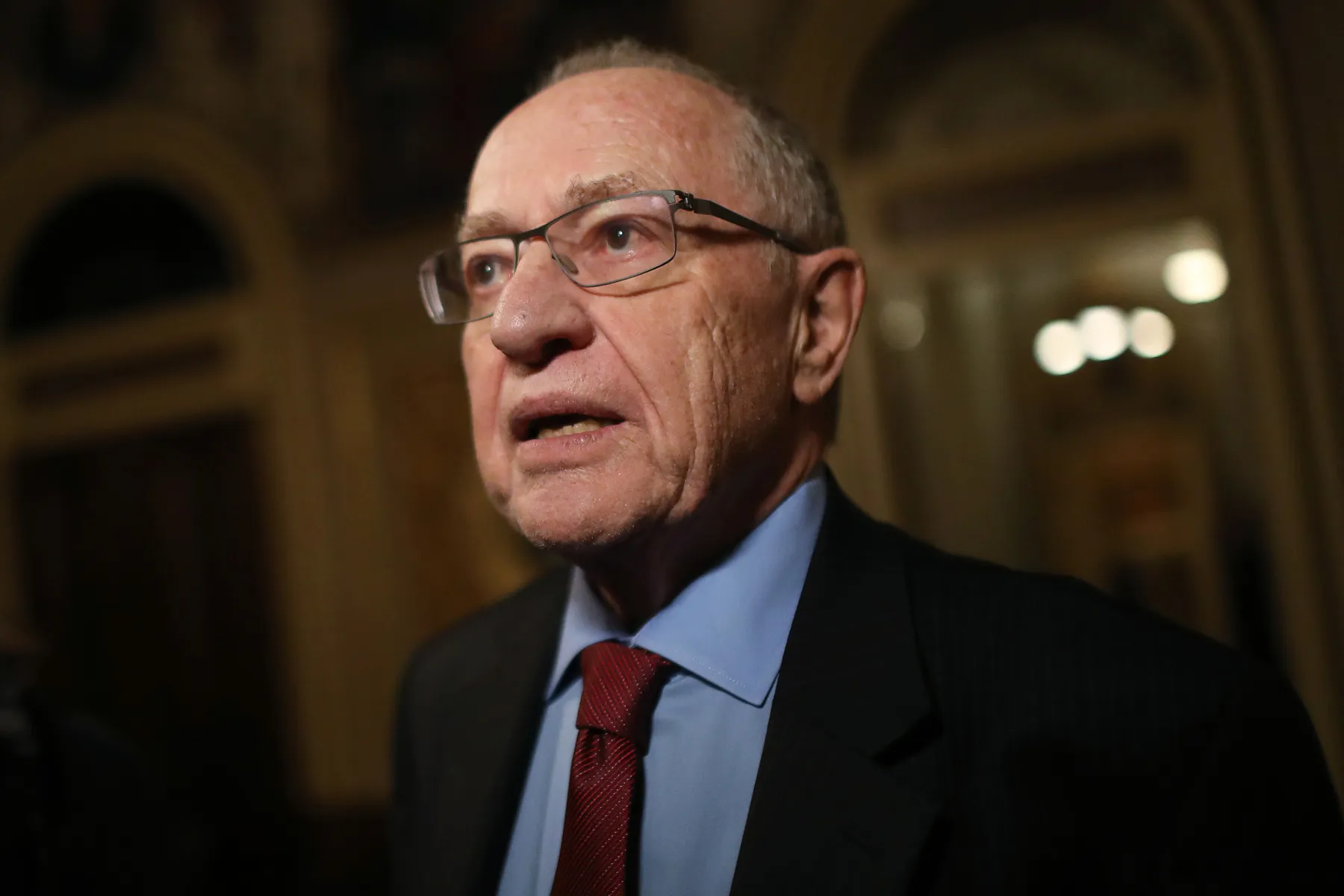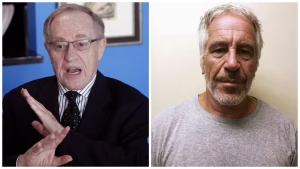In a bombshell interview aired on Sean Spicer’s program, Harvard Law professor emeritus Alan Dershowitz reignited national controversy surrounding the still‑unresolved questions about Jeffrey Epstein’s network and the individuals tied to him. Dershowitz stated unequivocally that he has seen the full Epstein “client list” — a document the federal government denies exists — and suggested that powerful forces are preventing its release to protect certain high‑profile individuals.
“Documents are being suppressed to protect individuals,” Dershowitz asserted during the interview. “I know the names of the individuals. I know why they’re being suppressed. I know who’s suppressing them. But I’m bound by confidentiality.”
The statement was startling not only for what it claimed, but for what it implied about the government’s handling of the Epstein case. Dershowitz’s comments landed just a day after both the FBI and the Department of Justice issued a memo denying, once again, that any official Epstein “client list” exists. According to the agencies, their internal review concluded that there was no evidence Epstein ever maintained a client list, nor anything proving that he systematically blackmailed influential figures.
The agencies also reiterated the government’s longstanding position: that Epstein died by suicide in a Manhattan jail cell in 2019 while awaiting trial on charges of sex trafficking minors. That conclusion has been widely contested by members of the public, numerous lawmakers, and many commentators who have long accused authorities of concealing crucial details of the case.
Dershowitz’s claims reopened that debate — and widened it. If he truly has knowledge of a list containing names of individuals connected to Epstein’s activities, and if documents are indeed being held back to protect those individuals, the implications are massive. Not only would it call into question the credibility of the DOJ and FBI, it would also suggest that the American public has been given only a fraction of the truth about one of the most explosive criminal scandals of the last half‑century.
At the same time, Dershowitz was careful not to reveal any specific names. He declined to provide details about who is allegedly being protected or who is doing the protecting, citing confidentiality. That restraint, however, did nothing to dampen the impact of his statements — if anything, it intensified speculation.
For years, the Epstein case has hovered in a liminal space between documented fact, public suspicion, political weaponization, and unanswered questions. Dershowitz’s assertions pushed many of these long‑simmering doubts back to the forefront. Social media platforms lit up within minutes of the interview airing, with many Americans demanding that all Epstein‑related materials be declassified and made available to the public.
Adding to the intrigue, Dershowitz’s interview coincided with heightened attention on comments from Attorney General Pam Bondi, who previously mentioned that she had Epstein documents “on her desk.” That remark led to widespread confusion and speculation that she was alluding to a verified client list — a claim the White House moved quickly to clarify.
During a White House briefing earlier in the week, Press Secretary Karoline Leavitt was pressed repeatedly on Bondi’s statement. Leavitt reaffirmed the position of the DOJ and FBI, emphasizing that neither agency has verified the existence of an official client list. She explained that Bondi’s reference to documents on her desk was about the full set of case files linked to Epstein, not about a specific item labeled as a client roster.
Leavitt also addressed why certain Epstein documents remain unreleased. She noted the presence of highly explicit material involving minors — content that is illegal to distribute and inappropriate for the public. “The materials that have not been released contain incredibly graphic child pornography, not appropriate for public consumption,” she stated, echoing previous law enforcement warnings about the nature of the evidence.
Fox News reporter Peter Doocy then pushed for more detail, asking whether Bondi’s earlier language could still imply that names of individuals connected to Epstein may indeed be within those files. Leavitt stressed that while the administration is committed to uncovering the full extent of Epstein’s criminal operations, it will not compromise ongoing investigations, violate federal law regarding explicit minor content, or jeopardize potential future prosecutions.
“The focus,” she said, “is on justice — without fear or favor.”
Still, despite strong denials from federal authorities, the appearance of contradictions and imprecise phrasing in public statements continues to fuel distrust. For many observers, Dershowitz’s comments only added to the impression that there are answers the public still has not been given.
Whether intentionally or not, his remarks fit into a long‑running pattern: new disclosures followed by immediate government refutations, leaving a trail of confusion that never quite resolves. Every denial is followed by another revelation, every revelation by another clarification, and every clarification by more public skepticism.
The Epstein case has transcended the boundaries of a criminal matter. It has become a symbol — of elite privilege, of government opacity, of potential cover‑ups, and of a justice system that many Americans believe is applied unequally. Dershowitz’s comments play directly into those perceptions, suggesting that the truth is known but being concealed.
The broader question that now looms is whether the public will ever see the full unredacted Epstein files. What appears certain is that the current calls for transparency will only grow louder. Members of Congress have already begun asking whether the agencies’ denial of a client list is based strictly on the semantics of what qualifies as a “list,” rather than on whether names of individuals appear within Epstein’s seized materials. Others have pointed out that the government has a history of shielding sensitive names during ongoing investigations, only to release them years later.
Regardless of the approach, the thirst for clarity has not waned since Epstein’s 2019 death. Instead, the passage of time has only magnified demands for accountability. Many Americans feel that the government’s narrative around Epstein’s life, crimes, connections, and death has never fully added up. The more information that trickles out, the more the public is left wondering what else has not been shared.
Dershowitz concluded his interview without offering further details, but the damage — or the illumination, depending on one’s viewpoint — was already done. His claim that he knows exactly who is being protected and why adds new urgency to long‑standing questions that have never been fully answered.
In a political era defined by skepticism toward institutions, Epstein remains one of the clearest and most potent symbols of that distrust. Until the government provides full transparency, speculation will continue to flourish and confidence in official explanations will continue to erode.
One thing is becoming increasingly clear: the Epstein case is not going away. No matter how many statements, memos, or press briefings attempt to close the door, new revelations keep opening it wider. Dershowitz’s comments are just the latest reminder that the public still does not feel it has the full truth — and will continue demanding it.
The public deserves answers — and accountability. Until every relevant document is released and every credible lead is followed, the Epstein saga will remain one of the most troubling unresolved chapters in modern American justice.

Sarah Mitchell is a bestselling novelist recognized for her insightful and emotionally resonant stories that explore the complexities of human relationships. Originally from Denver, Colorado, Sarah grew up in a family of teachers who nurtured her curiosity and love for storytelling. She studied psychology at Stanford University, where she became fascinated by the intricacies of human behavior—an interest that would later shape her writing career. Sarah’s novels are praised for their nuanced characters, intricate plots, and ability to capture the subtle tensions that define love, friendship, and family ties. Her breakthrough novel, The Spaces Between Us, became an instant bestseller, lauded for its honest portrayal of strained family relationships and the fragile bonds that hold people together. Since then, she has published several works that continue to captivate audiences around the world. Outside of her writing career, Sarah is passionate about mental health advocacy and often partners with organizations to promote awareness and support for those struggling with emotional well-being. Her personal life is quieter—she enjoys hiking in the Colorado mountains, practicing yoga, and spending time with close friends. With each new book, Sarah Mitchell cements her reputation as a writer who illuminates the beauty and struggles of human connection.









